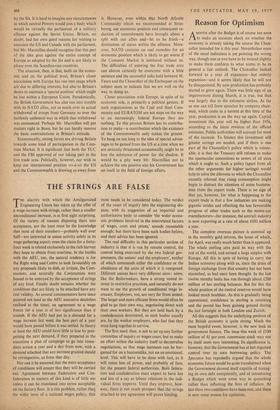THE STRINGS ARE FALSE
rr HE alacrity with which the Amalgamated I Engineering Union has taken up the offer of a wage increase with strings, rather than a smaller unconditional increase, is at first sight surprising. Of the variety of reasons disposing them into acceptance, not the least must be the knowledge that most of their members—probably well over half—are interested in union activity solely in its wage-gathering aspect; even the claim for a forty- hour week is related exclusively to the rich harvest they hope to obtain from overtime. In the battles with the AEU, too, the natural tendency is for the Right wing and Centre to look favourably on any proposals likely to dish, or irritate, the Com- munists; and naturally the Communists were bound to be annoyed by the acceptance of strings of any kind. Finally doubt remains whether the conditions that are likely to be attached have any real validity. As several commentators have since pointed out (and as the AEU executive doubtless realised at the time), an agreement to a wage freeze for a year is of less significance than it sounds. If the AEU had put in a demand for a wage increase last week the best part of a year would have passed before it was settled. In theory at least the AEU could have little to lose by post- poning the next demand, if they prepared in the meantime a plan of campaign to go into imme- diate action a year and a day from now, with a. demand attached that any increase granted should be retrospective, as from that day.
Nor can it be assumed that the mere acceptance of conditions will ensure that they will be carried out. Agreement between Federation and Con- federation in matters of this kind is of little use unless it can be translated into terms acceptable on the factory floor. It is this problem, rather than the wider issue of a national wages policy, that most needs to be considered today. The verdict of the court of inquiry into the engineering dis- pute, with its suggestion of an impartial and authoritative body to consider 'the wider econo- mic problems involved in the interrelated factors of wages, costs and prices,' sounds reasonable enough; but there have been such bodies before, and their advice has been ignored.
The real difficulty in this particular section of industry is that it is run by remote control, the control being exercised by the two federal gov- ernments, the unions' and the employers', neither of which commands either the confidence or the obedience of the units of which it is composed. Different unions have very different aims: some, like the Boilermakers, have a strong vested in- terest in restrictive practices, and naturally do not want to see the growth of conditional wage in- creases. Employers, too, are very far from united. The larger and more efficient firms would often be glad to go their own way, negotiating direct with their own workers. But they are held back by a confederation dominated, as such bodies usually are, by the weaker employers, who feel that they must hang together to survive.
The first need, then, is not to set up any further committee of inquiry or wages court, but to make an effort within the industry itself to decentralise negotiations, so that wage increases can be bar- gained for on a businesslike, not on an emotional, level. This will have to be done with tact, as it will mean loss of power, and probably of face, for the present federal authorities. Both federa- tion and confederation must expect to have less and less of a say as labour relations in the indi- vidual firms improve. Until they improve, how- ever, there is not much prospect that the strings attached to any agreement will prove binding.


































 Previous page
Previous page